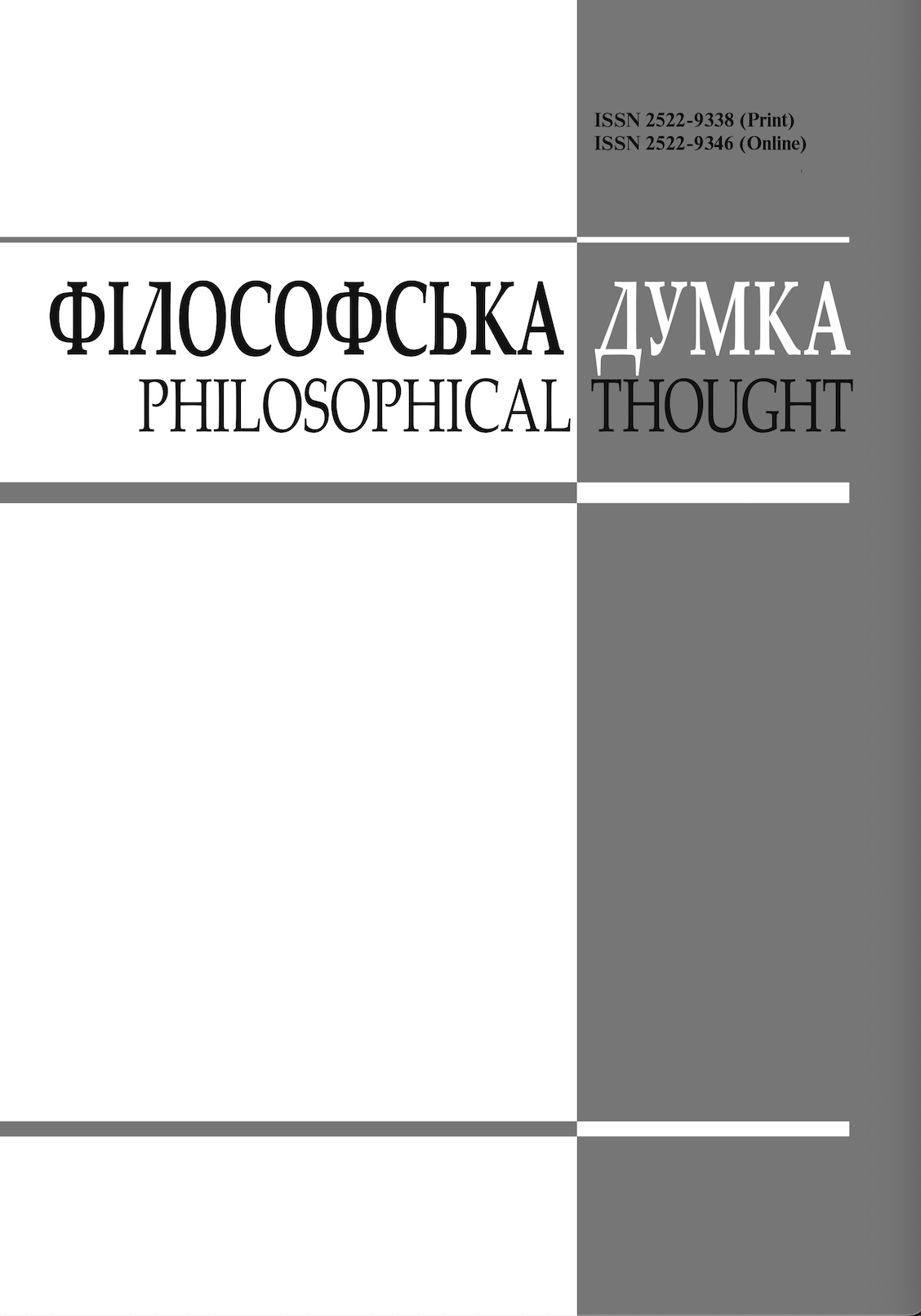Pretended antinomy of historical experience: To the G.-G. Gadamer and F.R. Ankersmit interpretations of the historical experience concept
PHILOSOPHY OF HISTORY
DOI:
https://doi.org/10.15407/fd2024.01.071Keywords:
hermeneutics, narrativism, philosophy of history, sublime historical experience, historiography, identity, Gadamer, AnkersmitAbstract
The article is devoted to the analysis of the phenomenon of historical experience in Gadamer's hermeneutics and Ankersmit's philosophical-historical concept. The interest of the philosophy of history in experience was actualized against the background of exhaustion of the heuristic potential of historical narrativism and constructivism, closely related to the so-called "linguistic turn". At first glance, Gadamer and Ankersmit are representing antinomic interpretations of historical experience: as mediated by the effects of involvement in a tradition or heritage and direct, extracontextual encounter with the past. However, the investigation proves that, despite the apparent antinomy of these approaches, the Gadamerian hermeneutic experience as an experience of the prevailing historical reality is not so far from the sublime historical experience of Ankersmit. And, on the contrary, the sublime historical experience, despite its claims to immediacy, turns out to be an experience of the finitude of human existence, that is, it is close to what Gadamer considered the essence of hermeneutic experience. In both cases, historical experience is considered as a condition for the possibility of understanding the past, and therefore, the question of the universal structure of such experience and understanding necessarily arises. The differences in the positions of the two authors stem from fundamentally different ontological prejudices that they share. For Gadamer, this is the reduction of history to a linguistically structured heritage, as a result of which most of the past falls out of hermeneutic experience. For Ankersmit, this is an uncritical understanding of time, as a result of which his concept of the sublime does not receive a reliable methodological foundation. Clarification of the temporality of the sublime historical, as well as rejection of the rigid connection between historical experience and language, open the prospect of removing the abstract antinomy of contextuality and immediacy of historical experience. The temporality of human existence turns out to be a universal prerequisite of historical experience, the two opposite forms of which are heredity and discontinuity. Contrary to the widespread criticism of Ankersmit's theory as far from historiographical practice, the development of the potential of the concept of sublime historical experience reveals its relevance to the dynamic and tragic modern history that Ukraine is currently experiencing.
References
Anderson, B. (2006). Imagined Communities. Reflections on the Origin and Spread of Nationalism. London, New-York: Verso.
Ankersmit, F.R. (2005). Sublime Historical Experience. Stanford: Stanford University Press.
https://doi.org/10.1515/9781503624597
Ankersmit, F., Menezes, J. (2017). Historical experience interrogated: A conversation. Journal of the Philosophy of History, 11(2), 247-273.
https://doi.org/10.1163/18722636-12341369
Depcat, V. (2009). The "cultural turn" in German and American historiography. American Studies, 54(3), 425-450.
Domańska, E. (1998). Hayden Whyte. Encounters. Philosophy of History after Postmodernism (pp. 13-38). Charlottesville, London: University Press of Virginia.
Domańska, E. (2006). The Material Presence of the Past. History and Theory, 45(October 2006), 337-348.
https://doi.org/10.1111/j.1468-2303.2006.00369.x
Domańska, E. (2009). Frank Ankersmit: From narrative to experience. Rethinking History, 13(2), 175-195.
https://doi.org/10.1080/13642520902833809
Ferguson, N. (1999). Virtual History: Towards a "chaotic" theory of the past. Virtual History: Alternatives and Counterfactuals (pp. 1-90). Cambridge: Basic Books.
Gadamer, H.-G. (2005). Way to turn. [In Russian]. In: Heidegger's ways: studies of late creativity (pp. 139-158). Minsk: Propylaea.
Gadamer, H.-G. (2000). Wahrheit und Method. Grundzuge einer Philosophischen Hermeneutic. [In Ukrainian]. Kyiv: Universe.
Halbwachs, M. (1968). La Mémoire Collective. Paris: P.U.F.
Heidegger, M. (1967). Sein und Zeit. Tübingen: Max Niemeyer Verlag.
Jay, M. (2022). Genesis and Validity. The Theory and Practice of Intellectual History. Philadelphia: University of Pennsylvania Press.
https://doi.org/10.9783/9780812299991
Kant, I. (1994). Kritik der Urteilskraft. [In Russian]. Moscow: Iskusstvo.
Kellner, H. (2022). Ankersmit: the sublime escape from language. The Routledge Companion to Historical Theory (pp. 524-528). London, New-York: Routledge.
https://doi.org/10.4324/9780367821814-32
Koselleck, R. (2005). Vergangene Zukunft. Zur Semantik geschichtlicher Zeiten. [In Ukrainian]. Kyiv: Duch i litera.
Le Goff, J. (1996). History and Memory. New-York: Columbia University Press.
Menezes, J. (2018). Aftermaths of the dawn of experience: on the impact of Ankersmit's sublime historical experience. Rethinking History, 22(1), 44-64.
https://doi.org/10.1080/13642529.2017.1423009
Nora, P. (1984). Entre mẻmoire et histoire. In: Les lieux de mẻmoire. 1: La Rẻpublique. Paris: Gallimard.
Proleiev, S., Zymovets, R., Kobets, R. (2023). Discourses in a global world. [In Ukrainian]. Kyiv: Duh i litera.
Shanks, M. (2019). The Archeological Imagination. Draft. In: A. Abraham (Ed.), The Cambridge Handbook of the Imagination (pp. 1-20). S.l.
Tonner, Ph. (2015). Epoch: Heidegger and the Happening of History. Minerva - An Open Access Journal of Philosophy, 19, 132-150.
Zymovets, R.V. (2022). Memory Discourses and Critical Scientific History. On the Specificity of Modern Historical Discourses. [In Ukrainian]. Philosophical Thought, 2, 108-124.
Downloads
-
PDF (Українська)
Downloads: 185
Published
How to Cite
Issue
Section
License
Authors who publish with this journal agree to the following terms:
- Authors retain copyright and grant the journal right of first publication.
- Authors are able to enter into separate, additional contractual arrangements for the non-exclusive distribution of the journal's published version of the work (e.g., post it to an institutional repository or publish it in a book), with an acknowledgement of its initial publication in this journal.
- Authors are permitted and encouraged to post their work online (e.g., in institutional repositories or on their website) prior to and during the submission process, as it can lead to productive exchanges, as well as earlier and greater citation of published work (See The Effect of Open Access).


